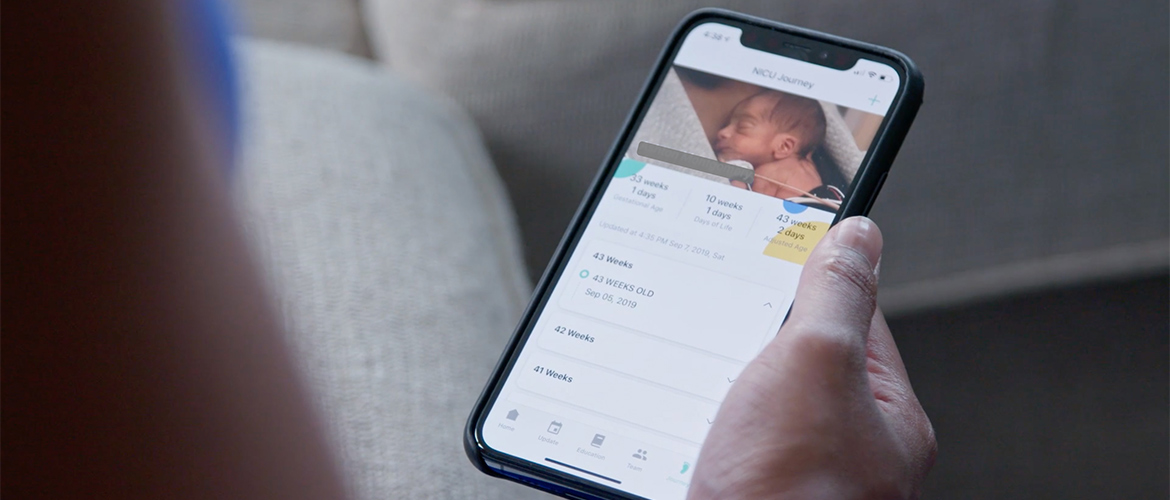At 23 weeks gestation, a rare pregnancy-related complication forced Meg Hamilton to have a caesarean section to save her life and give birth to her baby Will four months early.
Weighing 1 pound at birth, Will had a 50-50 survival chance, she and her husband, Dave Hamilton, say. Doctors expected him to spend at least four months in the neonatal intensive care unit (NICU) at Northwestern Medicine Central DuPage Hospital in Winfield, Illinois.
“It was traumatic,” recalls Meg Hamilton, who underwent in vitro fertilization to conceive the baby the Elmhurst, Illinois, couple considers a miracle.
As Will’s condition developed, updating about 70 members of the couple’s large family became overwhelming.
“There was a lot going on in a very short amount of time,” Dave Hamilton recalls. “We were looking for a way to communicate with everyone that was secure and also that we could invite people to. But there are some people that didn't need to know the entire story. And there were some people that we did want to know the entire story.”
A smartphone app developed by a Northwestern University team offered most of the features the Hamiltons needed to track and update everyone on Will’s progress until his hospital discharge. The app, NICU2Home, provides updates on NICU newborns and allows parents to share as much information as they want and with whom.
Dr. Craig Garfield and engineer Young Seok Lee created the app to keep parents informed about their baby’s care no matter their location. Most parents don’t expect their baby to require intensive care, and they easily can become overwhelmed by the staggering amounts of information they receive during such a distressing period. So far, about 2,000 NICU parents have relied on the app for updates and information.
“What made us start to think about how we could do this was when smartphones really first came out, and I saw so many parents at the bedside with their phones while their baby was sleeping,” says Garfield, pediatrician and professor of pediatrics and medical social sciences at Northwestern University Feinberg School of Medicine. “We realized very early on that designing an app to deliver information that was personalized and specific for that particular baby in that particular situation that we could extract the exact information we wanted to send to those parents so as not to overwhelm them.”
HCSC leaders believe the NICU2Home app could help lower-income, urban and suburban NICU parents with transportation, work flexibility or child-care challenges. The app would allow parents to remain engaged and connected to their NICU baby, reducing the stress of trying to maintain a continuous beside presence.
“Part of what we're trying to do is help support research that helps improve the care and the health outcomes for babies that are premature and also helping them in that transition to home process,” says Dr. Derek Robinson, a vice president and chief medical officer for HCSC's Illinois plan. “We think this is a tremendous opportunity to address some of the disparities that impact the lived experience of the parents who are caring for these children.”
The app’s use could significantly enhance a parent’s ability to care for their newborn, based on a study published in the Journal of Pediatrics.
Garfield and Lee found that among Prentice NICU parents who used it, the app boosted their confidence in caring for their babies and continued to help them up to a month after their babies’ hospital discharges.
“Our hope is that the information that we provide in the app actually helps parents feel confident enough that they didn't have to immediately run as soon as their babies showed one sign of something or the other into the doctor's office,” Garfield says.
Lee, an adjunct professor at Northwestern University’s Feinberg School of Medicine with a Ph.D. in industrial engineering, wants to create apps to address other maternal infant care areas, including postpartum depression.
“I think still there are a lot of innovation we can create to address challenges,” he says, adding that he’d like to expand NICU2Home’s access nationwide.
Maintaining connection and reducing worry
Central DuPage Hospital’s NICU sometimes cares for babies from as far away as the Iowa state line. Access to the NICU2Home app may help reduce the anxiety and worry of parents who can’t always be at their baby’s side, says Dr. Jeffery Loughead, medical director for the hospital’s Lurie Children's Program.
“Updating the families in a real-time basis is enormous,” he says. “It really allows them to touch base with their baby right away. Also, the educational features of the app allow the parents to be better informed as to what their baby is experiencing medically and what to expect developmentally at each gestational milestone.”
For the Hamiltons, having a secure place to share photos and post comments with family helped everyone stay connected during Will’s NICU stay.
“Posting and keeping track of his milestones was huge,” Meg Hamilton says. “It was great for us to have something to share with people and show how well he was doing.”
Her husband agrees.
“It was massive for our family to have that app as much as it was a convenience to us,” he says.


